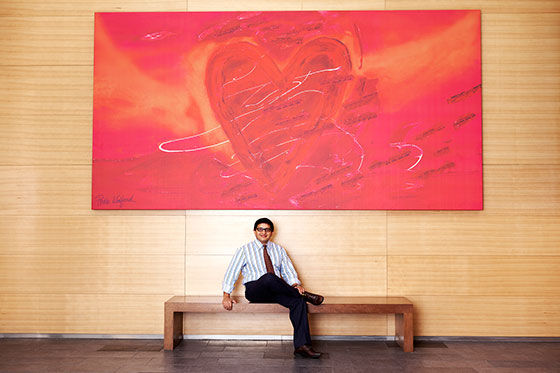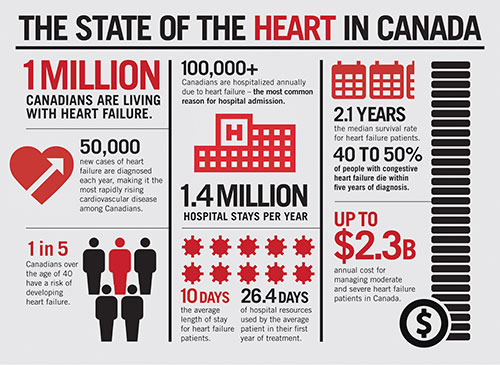
“The most unique aspect of the Centre is that it’s structured to leverage the strength of three – by themselves world-class centres – to work together towards a common goal,” says Dr. Mansoor Husain, Interim Executive Director of the Ted Rogers Centre for Heart Research. (Source: Margaret Mulligan)
Hailed as bold, ambitious, and transformational in its novel approach to addressing the growing burden of cardiovascular disease, the Ted Rogers Centre for Heart Research (TRCHR) – created via a landmark donation in Canadian healthcare – marks its one-year anniversary on Nov. 20.
The TRCHR's three partners – the University Health Network (UHN), The Hospital for Sick Children (SickKids) and the University of Toronto (U of T) – work together to advance research on the treatment and prevention of heart disease. One of its clinical goals, taking place at UHN, is to reduce heart failure by 50 per cent over the next 10 years.
“The most unique aspect of the Ted Rogers Centre for Heart Research is that it’s structured to leverage the strength of three – by themselves world-class centres – to work together towards a common goal,” says Dr. Mansoor Husain, Interim Executive Director of the Ted Rogers Centre for Heart Research.
A new precedent
The historic first-in-Canadian-healthcare private donation of $130-million – by the Rogers family – brought the Ted Rogers Centre for Heart Research to life last November. The three collaborating institutions committed to match the initial funding, which brought the total investment to $269 million.
"The first year has been about establishing a culture, a model of how we're going to do it, getting people on board with the idea, and then beginning to roll out the resources," explains Dr. Husain. "At each site, we've done different things to advance our research," he says.
University Health Network:
At UHN’s Peter Munk Cardiac Centre (PMCC), which houses the Ted Rogers Centre for Heart Research, a major focus of the research is on secondary prevention. This involves a deeper understanding of how to avoid re-admitting patients who have already been both hospitalized for heart failure and discharged.
"Secondary prevention is about preventing people from deteriorating or from coming back with another attack of heart failure," explains Dr. Husain.
To prevent patients from requiring re-hospitalization, UHN researchers have developed real-time remote patient monitoring technologies that report a patient's health at home. This keeps their health team informed and enables steps to be taken before the patient reaches critical condition.
"Remote patient monitoring is designed to encourage patient self-care and caregiver empowerment, lessening the dependence on traditional care providers. This has shown to improve health outcomes while ensuring the financial sustainability of the program," says Dr. Heather Ross, TRCHR Scientific Lead at UHN, PMCC Cardiologist, and Medical Director of UHN's Cardiac Transplant Program.

(Source: Ted Roger Centre for Heart Research)
In addition, PMCC's Cardiac Function Program spearheaded the creation of an outpatient intravenous therapy room at Toronto General Hospital, helping treat patients without admitting them.
Hires and appointments within the first year
TRCHR
Linda Donovan – Planning and Operations Manager
Jeff Jurmain – Communications Officer
UHN - Integrated Program for Excellence in Heart Function
Scientific lead: Heather Ross
Nursing professors for Cardiac Function Program:
Meredith Linghorne, Ted Rogers Heart Function Clinical Nursing Professor
Nadia Thomson, Ted Rogers Heart Function Clinical Nursing Professor
Jane MacIver, Ted Rogers Heart Function Research Nursing Professor
Ted Rogers Program for the Prevention of Cardiac Toxicity:
Linda Belford, acute care nurse practitioner
Biobank:
Dr. Phyllis Billia, leader
Sheena Perron, research coordinator
Cardiovascular Data Management Centre & Computational Biomedicine Program:
Cedric Manlhiot PhD, Director
Edgar Crowdy, software engineer
Tanveer Collins, programmer analyst
Steve Fan PhD, biostatistician
Joshua Murray, biostatistician
Sadia Wasik, data manager
Kate Westcott, program coordinator
The Cardiotoxicity Program
Lead - Dr. Dinesh Thavendiranathan
Quality Improvement
Lead: Dr. Sacha Bhatia
The role of PMCC, Canada's premier cardiac centre, in the Ted Rogers Centre for Heart Research extends further to include many projects developed to pinpoint why readmissions occur and how to improve heart failure discharge.
Other projects underway at PMCC integral to the mandate of the Ted Rogers Centre for Heart Research include: the Cardiotoxicity Program, responsible for a number of clinical trials; the Biobank, a facility that stores human blood and tissue samples of patients with cardiovascular disease; and the development of the TRCHR Computational Biomedicine Platform.
The latter will bring together clinical, imaging, physiological, genetic, patient-monitoring and patient-generated data in a single high performance computing facility. The Computational Biomedicine Platform will be a catalyst and accelerator for TRCHR quality improvement and clinical research projects.
Developing this platform also permits the development of unique and innovative clinical mobile applications. These apps will be used by frontline physicians to improve the quality, safety and efficiency of clinical care for patients seen at PMCC.
University of Toronto
The University of Toronto is leading research on stem-cell technology, focused on learning how to regenerate cells and tissue in various regions of the heart.
The core program of the Ted Rogers Centre for Heart Research at U of T is the Translational Biology and Engineering Program (TBEP). Pooling expertise from engineering and medicine, the TBEP will this month begin operation in the new MaRS West Tower – a major milestone for TRCHR in its first year.
"Working together will enable a comprehensive, multidisciplinary approach to heart failure that just hasn't been possible to date
– but is essential to establish this program as an important source of new discoveries and technologies for cardiovascular disease diagnosis and therapy," says Craig Simmons, scientific lead, TRCHR at U of T.
The Hospital for Sick Children
SickKids' role in TRCHR is to lead the Centre's genomic research for the purpose of preventing cardiac disease, namely through the Cardiac Precision Medicine Program and the Cardiac Genome Clinic.
The country's first Cardiac Precision Medicine Program will apply population-based approaches to decipher the genomic code of heart failure in children. Researchers are exploring the cause of Tetralogy of Fallot, the leading cause of 'blue baby' syndrome, a congenital heart condition that can lead to heart failure in the right ventricle despite early surgical repair. They are also analyzing new methods to diagnose and treat children with cardiomyopathy – where the heart's ability contract is compromised – who are at risk of progressive heart failure.
"This program is enabling us to study several thousand children with heart disease and combine genetic, environmental, lifestyle and clinical data to predict disease and find new therapies for heart failure," says Dr. Seema Mital, co-scientific lead, TRCHR at SickKids. "Targeting healthcare to the unique biological make-up of the child will help make treatments safer, precise and more effective."
At the same time, SickKids' Cardiac Genome Clinic will use genomic science to decode the genetic foundations of cardiac disease.
“The Ted Rogers Centre for Heart Research has provided a unique opportunity to make globally significant contributions in the field of cardiac health genomics,” says Dr. Ronald Cohn, TRCHR co-scientific lead with Dr. Mital.
The program will support the world's first adult and paediatric genome clinics, with the ultimate goal of being able to predict heart disease before it occurs, and enabling individualized therapies for children and adults based on each individual's unique genome.
SickKids has also increased the capacity of its Heart Centre Biobank to accept specimens from patients with heart disease and heart failure in particular.
"We're on our way," Dr. Mansoor Husain says of the work underway.
"The whole focus is on using genetics and cells to predict who is going to respond to treatment better. This is about personalizing treatment and discovering new treatments based mainly on regenerative medicine."
Hires and appointments in the first year
SickKids - Precision Medicine Program
Scientific leads: Seema Mital, Ronald Cohn
Tanya Daljevic, program manager
Jianpeng Xu, bioinformatician
Danny Lu, biostatistician
Reta Aram, laboratory technician
Piara Govender, clinical research coordinator
Julia Jeon, Assistant Research Technologist
Cardiac Genome Clinic
Eriskay Liston, genetics counsellor
Dr. Mohsen Hosseini, cardiac genomicist, senior research associate
Supported by Dr. Sarah Bowdin and Dr. Raymond Kim (clinical co-leads), and
Chris Carew, Project Director.
University of Toronto – Translational Biology and Engineering Program
Scientific lead: Craig Simmons
Principal investigators:
Anthony Gramolini
Paul Santere
Steffen-Sebastian Bolz
Michelle Bendeck
Rodrigo Fernandez-Gonzalez
Scott Heximer
Mary Cheng
